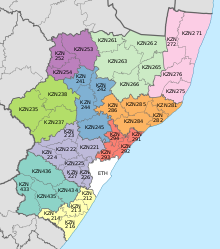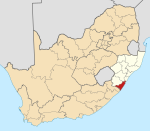Hibiscus Coast Local Municipality
Hibiscus Coast | |
|---|---|
 Location of Hibiscus Coast Local Municipality within KwaZulu-Natal | |
| Coordinates: 30°45′S 30°23′E / 30.750°S 30.383°E | |
| Country | South Africa |
| Province | KwaZulu-Natal |
| District | Ugu |
| Seat | Port Shepstone |
| Wards | 29 |
| Government | |
| • Type | Municipal council |
| • Mayor | Cynthia Mqwebu |
| Area | |
• Total | 839 km2 (324 sq mi) |
| Population (2011)[2] | |
• Total | 256,135 |
| • Density | 310/km2 (790/sq mi) |
| Racial makeup (2011) | |
| • Black African | 82.4% |
| • Coloured | 1.4% |
| • Indian/Asian | 5.1% |
| • White | 10.8% |
| First languages (2011) | |
| • Zulu | 70.7% |
| • English | 14.2% |
| • Xhosa | 7.7% |
| • Afrikaans | 4.5% |
| • Other | 2.9% |
| Time zone | UTC+2 (SAST) |
| Municipal code | KZN216 |
Hibiscus Coast Local Municipality was a local municipality in the province of KwaZulu-Natal in South Africa. It governed the Hibiscus Coast on the KwaZulu-Natal South Coast which attracts tourists from the province and other provinces as well as international tourists.
After municipal elections on 3 August 2016 it was merged into the larger Ray Nkonyeni Local Municipality.
Beaches are to be found along the entire seaboard. Hibberdene Beach, Ramsgate Beach, Marina Beach/San Lameer, and Lucien Beach have been recognized as Blue Flag beaches.[3] The climate of the coastal areas is humid and subtropical — comparable to southern Florida in the United States, but not quite as hot and rainy in the summer.
The coastline is dotted with small towns, many of which serve as seasonal recreational hubs, such as Port Shepstone, Umtamvuna / Port Edward, Margate, Hibberdene and Impenjati / Southbroom. These towns feature a wide range of tourist-oriented businesses, including restaurants, bars, clubs, movie houses, golf courses, clothing shops, museums, and various types of accommodations. The income from these businesses has economically benefited the municipality as a whole.[4]
Other economic activities include fishing, agriculture, crafts, and bead works.
The hilly inland regions of the municipality are largely under the ownership of tribal authorities. Such "traditional" settlements include KwaXolo, KwaNzimakwe, KwaNdwalane, KwaMadlala, KwaMavundla and KwaLushaba.
History
[edit]Prior to the demise of Apartheid in 1994, the Hibiscus Coast was divided into five main Transitional Local Councils, namely Port Shepstone, Margate, Hibberdene, Southbroom (Impenjati- Southbroom TLC) and Port Edward (Umtamvuna TLC).
Main places
[edit]The 2001 census divided the municipality into the following main places:[5]
| Place | Code | Area (km2) | Population |
|---|---|---|---|
| Anerley | 50601 | 1.2 | 376 |
| Brevo | 50602 | 0.24 | 27 |
| Gamalakhe | 50603 | 3.45 | 13,570 |
| Hibberdene | 50604 | 4.67 | 1,016 |
| Kwaxolo | 50606 | 167.84 | 48,024 |
| Lushaba | 50607 | 14.79 | 8,106 |
| Madlala | 50608 | 33.24 | 7,896 |
| Marburg | 50609 | 6.78 | 7,586 |
| Margate | 50610 | 10.05 | 8,654 |
| Marina Beach | 50611 | 1.13 | 123 |
| Mavundla | 50612 | 25.49 | 20,066 |
| Melville | 50613 | 1.17 | 327 |
| Munster | 50615 | 1.67 | 114 |
| Nsimbini/Ndwalane | 50616 | 34.77 | 36,335 |
| Nzimakwe | 50617 | 46.38 | 22,279 |
| Oslo Beach | 50618 | 3.13 | 2,052 |
| Port Edward | 50619 | 15.54 | 2,963 |
| Port Shepstone Part 1 | 50620 | 7.67 | 7,546 |
| Port Shepstone Part 2 | 50635 | 8.01 | 2,090 |
| Pumula | 50621 | 1.92 | 406 |
| Ramsgate | 50622 | 6.03 | 1,490 |
| San Lameer | 50623 | 1.75 | 81 |
| Sea Park | 50624 | 3.1 | 1,249 |
| Sentombi | 50625 | 7.81 | 869 |
| Shelly Beach | 50626 | 5.77 | 2,713 |
| Southbroom | 50627 | 10.3 | 862 |
| Southport | 50628 | 1.97 | 959 |
| Sunwich Port | 50629 | 0.5 | 626 |
| Trafalgar | 50630 | 4.89 | 424 |
| Umtamvuna Nature Reserve | 50614 | 18.82 | 21 |
| Umtentweni | 50631 | 10.11 | 3,445 |
| Umzumbe | 50633 | 2.3 | 452 |
| Uvongo | 50634 | 10.35 | 3,879 |
| Remainder of the municipality | 50605 | 358.15 | 11,130 |
Politics
[edit]The municipal council consisted of fifty-eight members elected by mixed-member proportional representation. Twenty-nine councillors were elected by first-past-the-post voting in twenty-nine wards, while the remaining twenty-nine were chosen from party lists so that the total number of party representatives was proportional to the number of votes received. In the election of 18 May 2011 the African National Congress (ANC) won a majority of forty-one seats on the council. The following table shows the results of the election.[6][7]
| Party | Votes | Seats | ||||||
|---|---|---|---|---|---|---|---|---|
| Ward | List | Total | % | Ward | List | Total | ||
| ANC | 54,658 | 55,515 | 110,173 | 70.2 | 21 | 20 | 41 | |
| DA | 14,580 | 14,769 | 29,349 | 18.7 | 8 | 3 | 11 | |
| IFP | 4,526 | 4,539 | 9,065 | 5.8 | 0 | 3 | 3 | |
| NFP | 2,347 | 2,189 | 4,536 | 2.9 | 0 | 2 | 2 | |
| COPE | 608 | 615 | 1,223 | 0.8 | 0 | 1 | 1 | |
| ACDP | 375 | 442 | 817 | 0.5 | 0 | 0 | 0 | |
| VF+ | 356 | 311 | 667 | 0.4 | 0 | 0 | 0 | |
| MF | 217 | 197 | 414 | 0.3 | 0 | 0 | 0 | |
| UDM | 219 | 140 | 359 | 0.2 | 0 | 0 | 0 | |
| Independent | 278 | – | 278 | 0.2 | 0 | – | 0 | |
| Total | 78,164 | 78,717 | 156,881 | 100.0 | 29 | 29 | 58 | |
| Spoilt votes | 1,263 | 1,000 | 2,263 | |||||
References
[edit]- ^ "Contact list: Executive Mayors". Government Communication & Information System. Archived from the original on 14 July 2010. Retrieved 22 February 2012.
- ^ a b c "Statistics by place". Statistics South Africa. Retrieved 27 September 2015.
- ^ "Our Beaches." Archived 2009-06-29 at the Wayback Machine Hibiscus Coast Municipality. Retrieved on Oct 7, 2009.
- ^ IDP Review 2008/2009. Archived 2009-06-29 at the Wayback Machine Hibiscus Coast Municipality. Retrieved on Oct 7, 2009.
- ^ Lookup Tables - Statistics South Africa[permanent dead link]
- ^ "Results Summary – All Ballots: Hibiscus Coast" (PDF). Independent Electoral Commission. Retrieved 3 December 2013.
- ^ "Seat Calculation Detail: Hibiscus Coast" (PDF). Independent Electoral Commission. Retrieved 3 December 2013.



